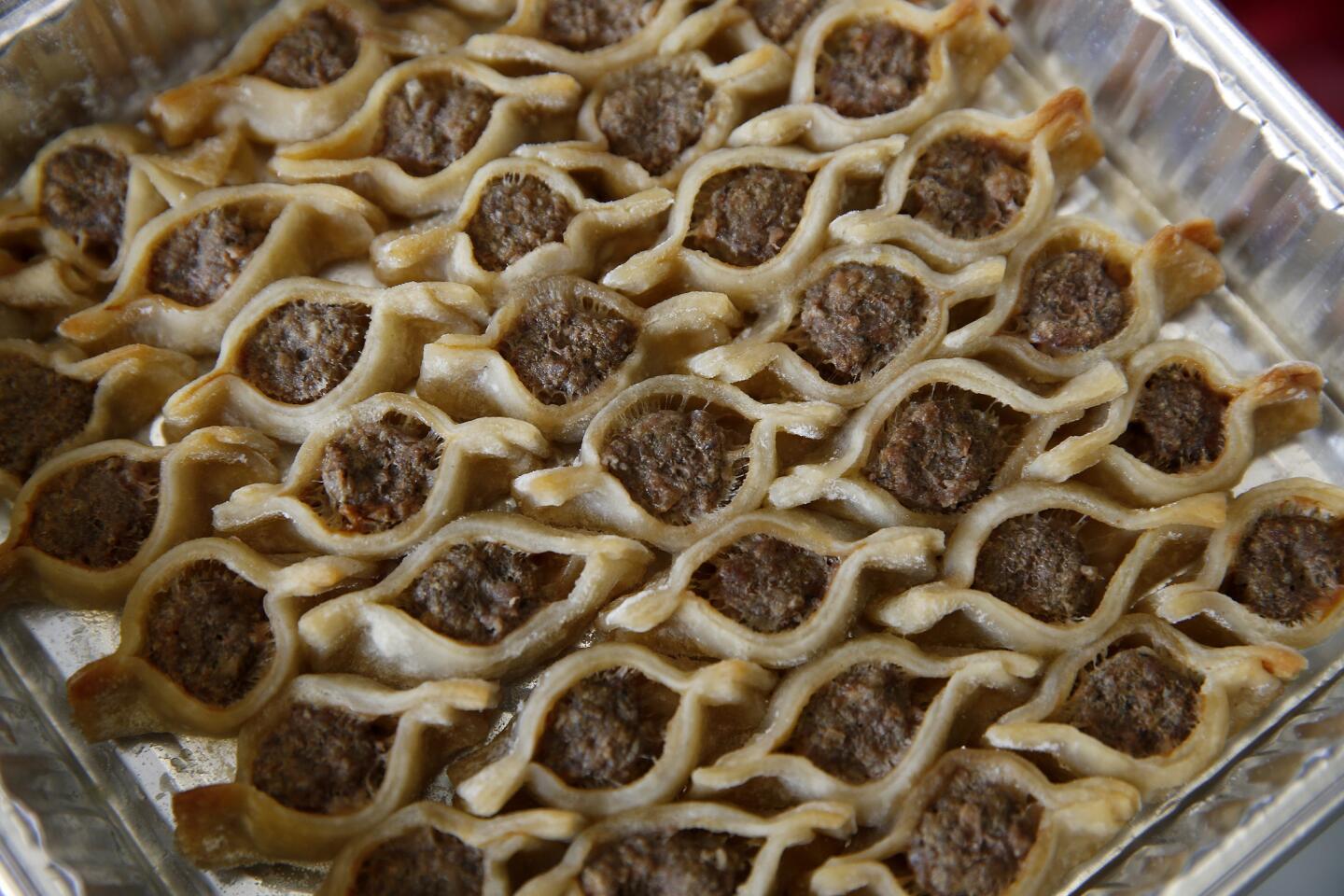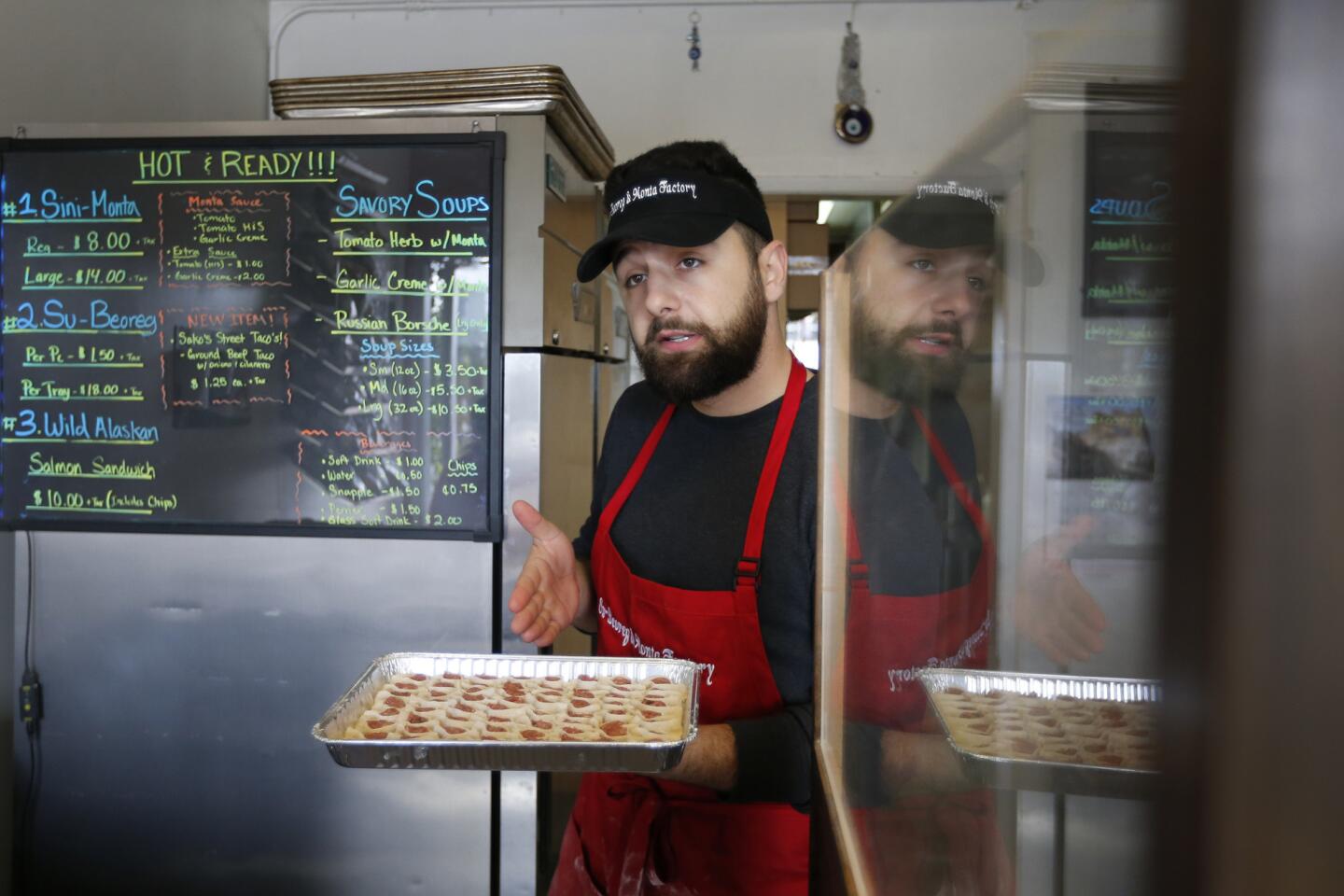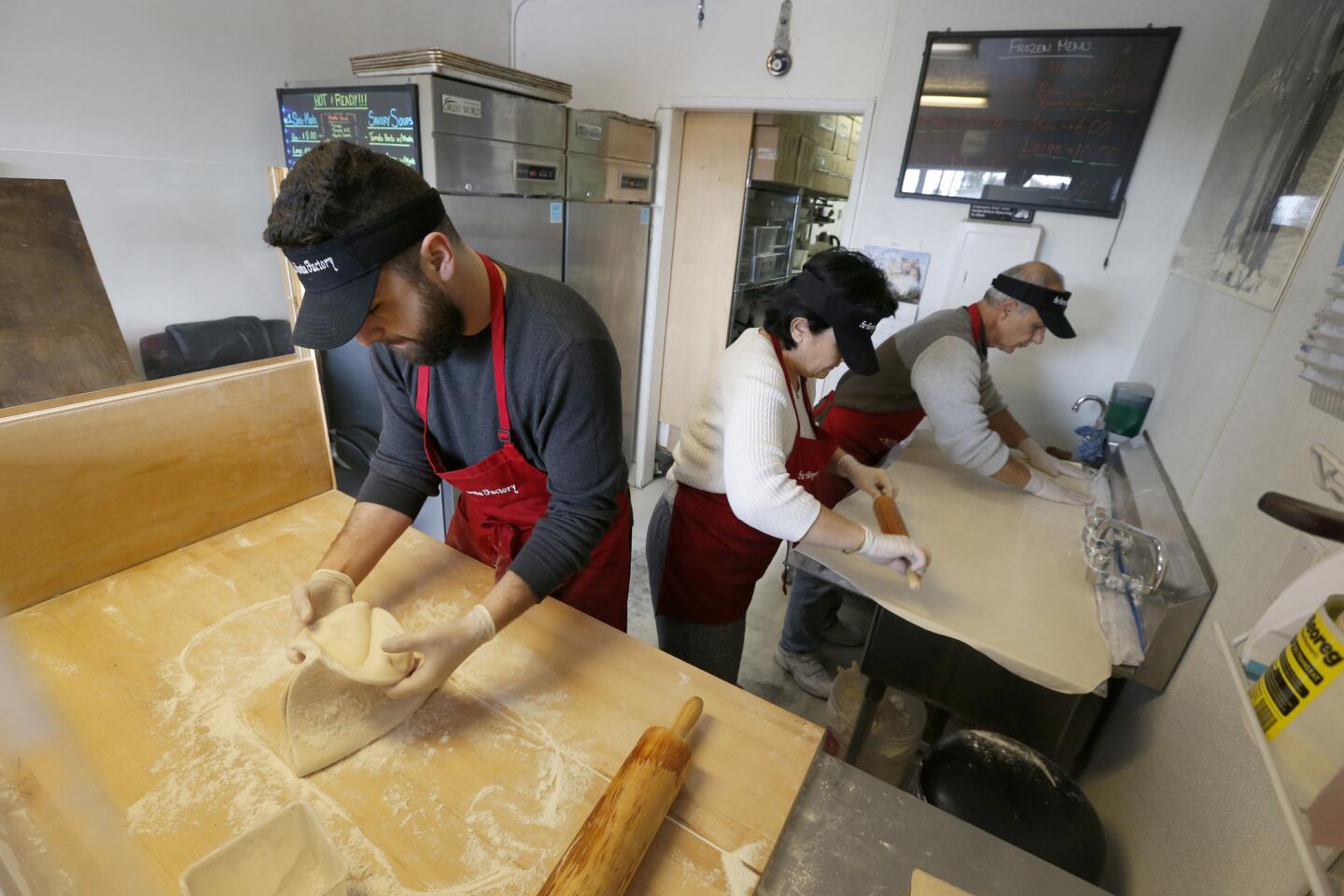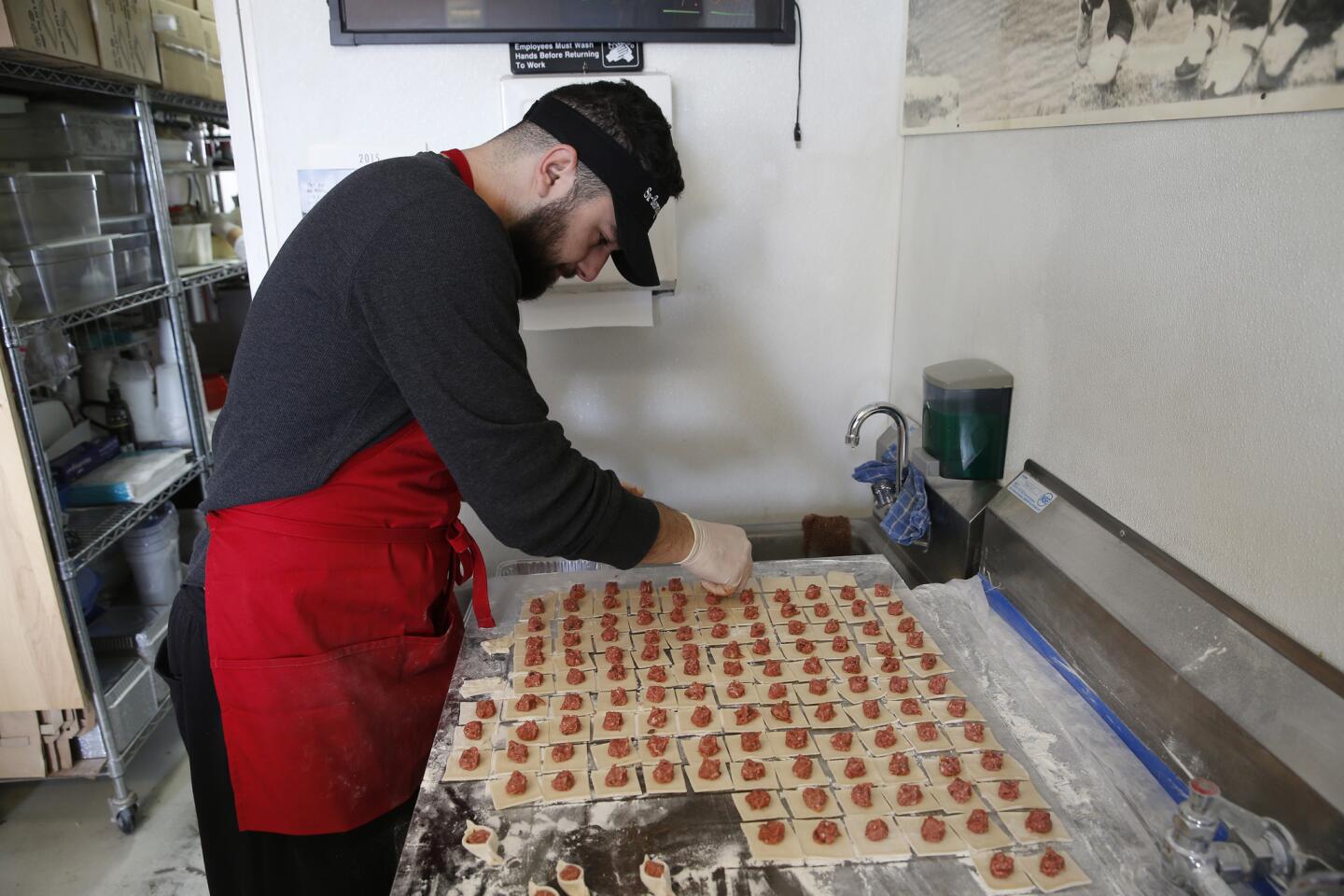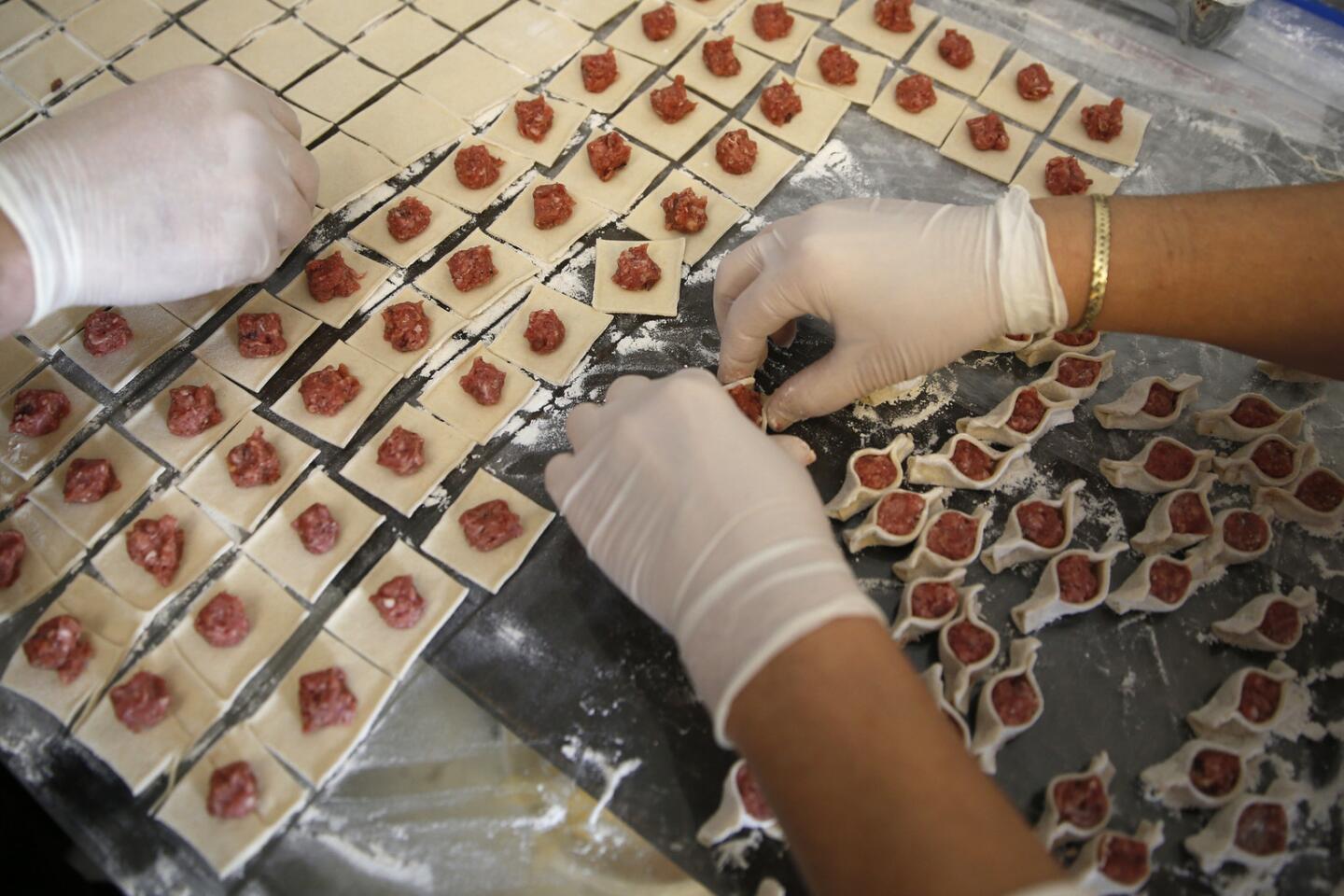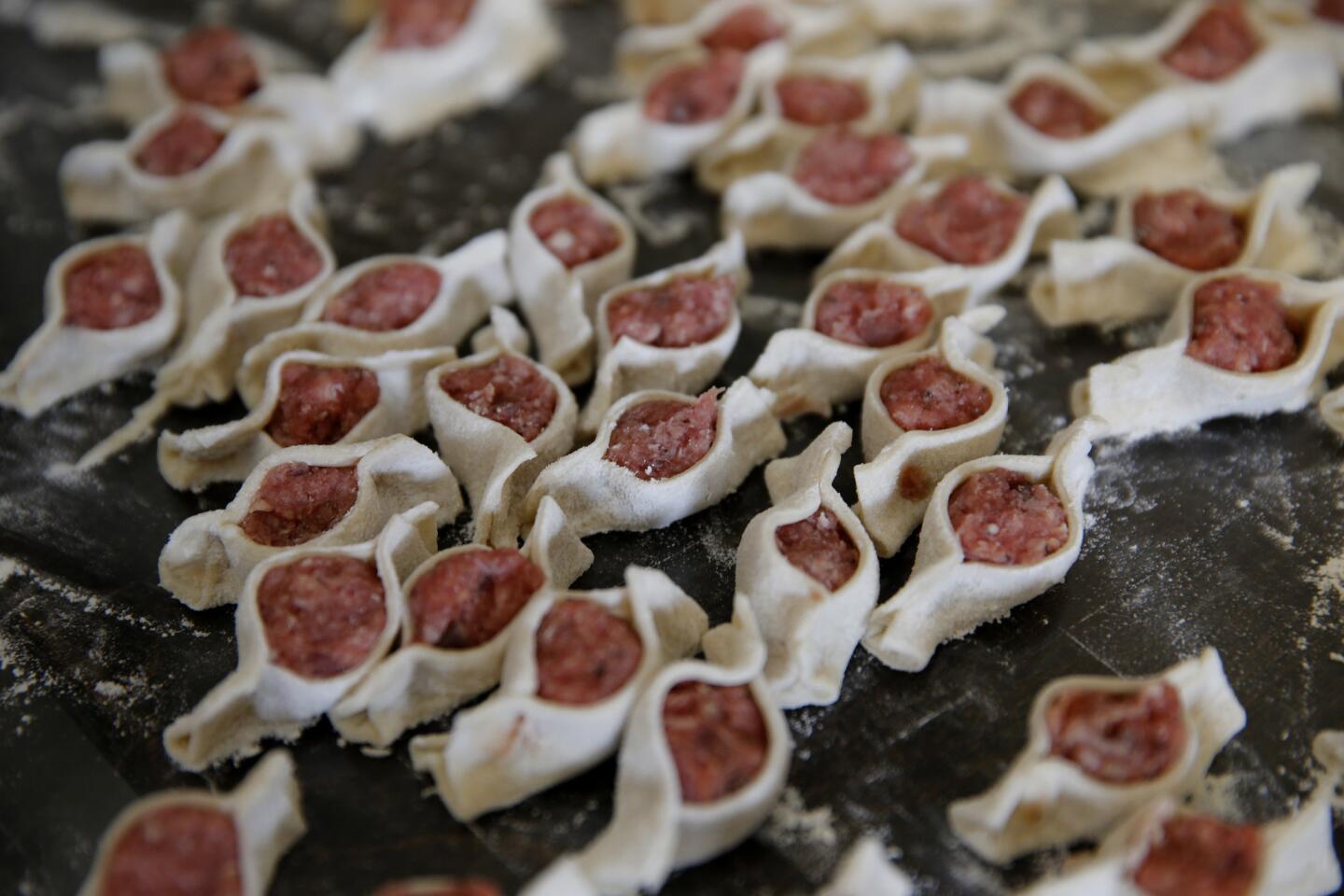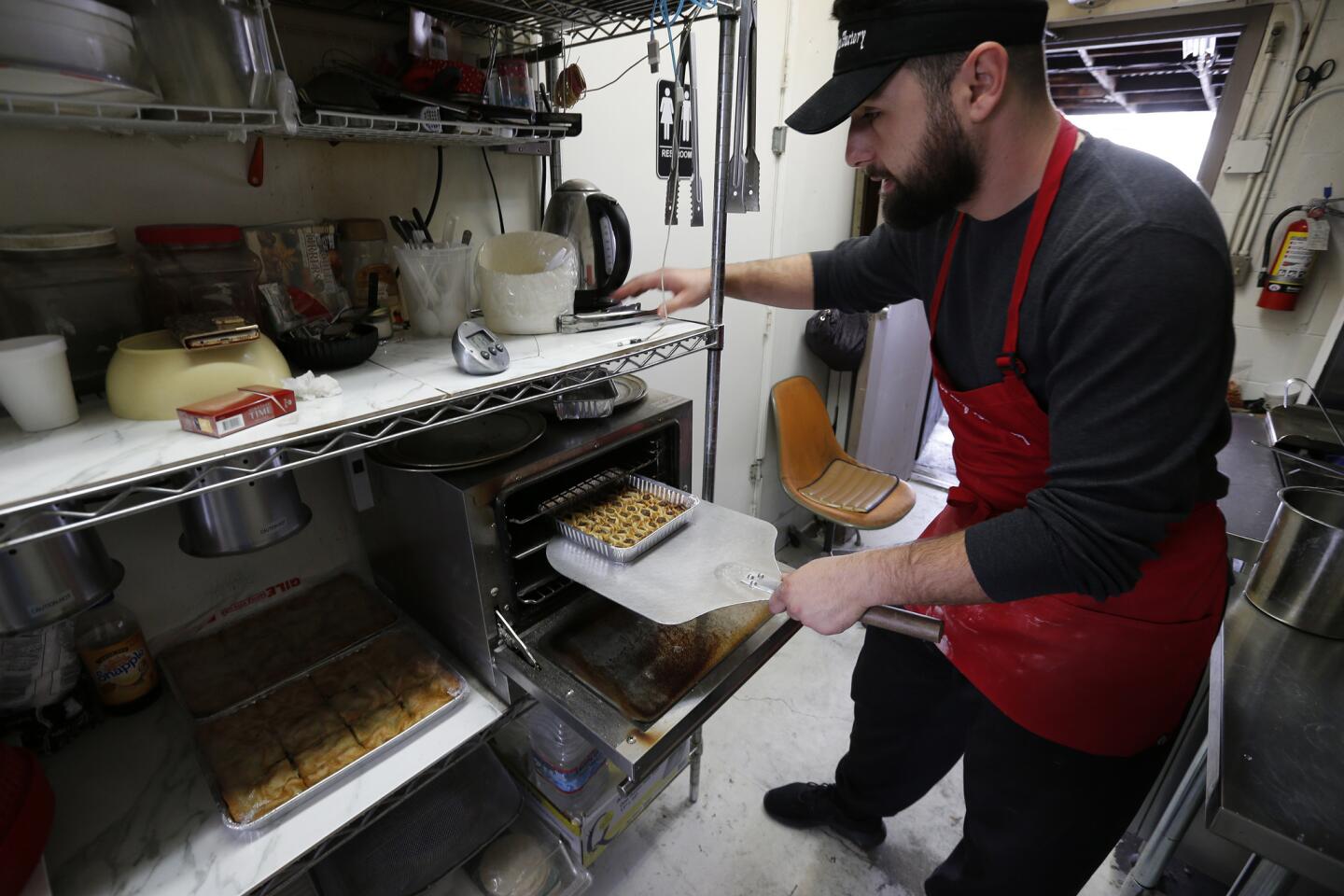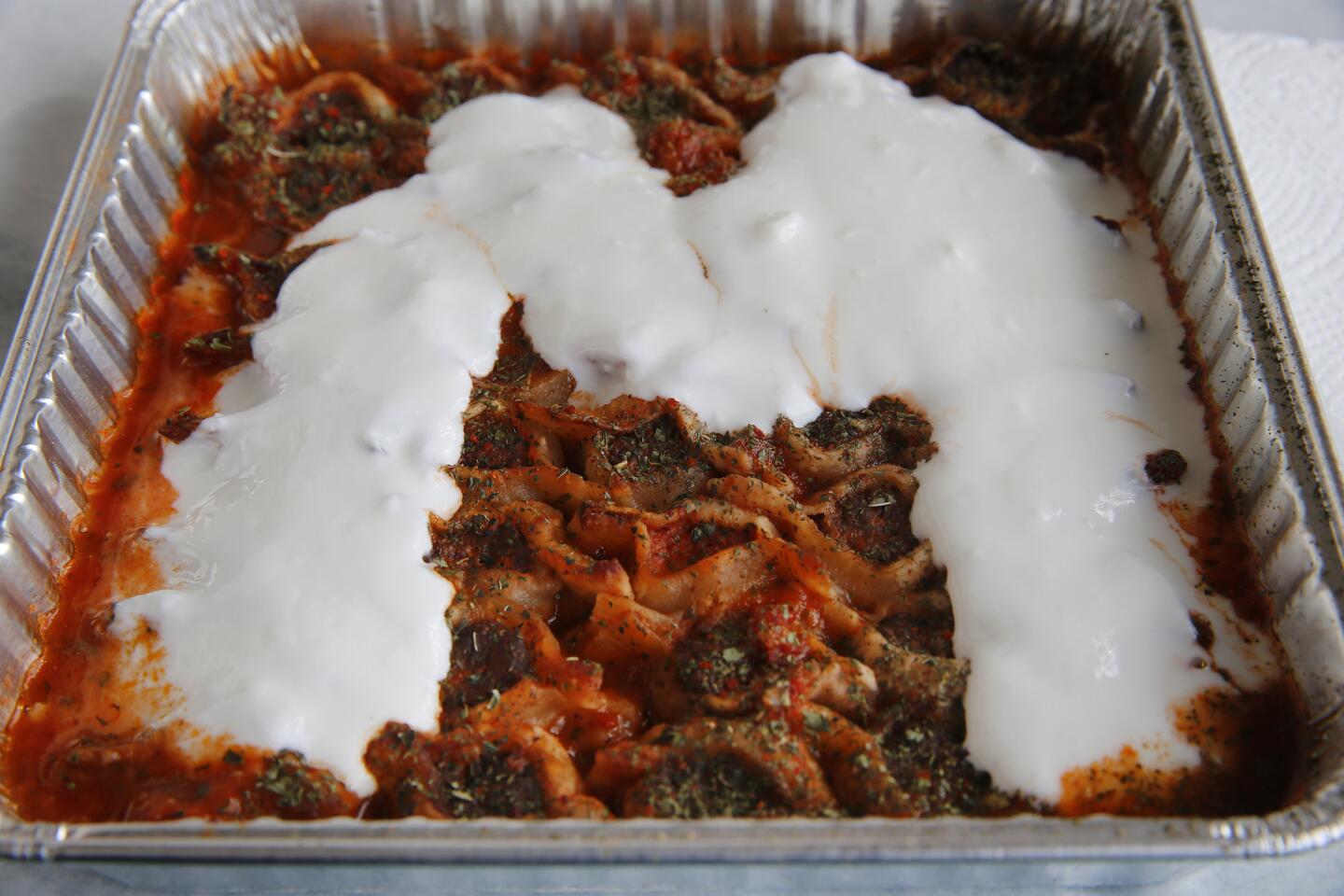The family behind Monta Factory makes manti from scratch. Are these dumplings better than grandma’s?
- Share via
On a recent morning just before sunrise, at a small storefront in North Pasadena, Evelina Yegiazaryan and her son, Sarkes, are hunched over a makeshift wooden counter, flour powdered across their matching aprons. They’re huddled together behind what looks like a walk-up deli — but instead of sandwiches behind the counter, there are hundreds of manti.
Manti (also spelled mante) are small, meat-filled dumplings that resemble tiny boats, baked until crisp around the edges, and served with a tomato sauce — or maybe garlic cream, depending on whom you ask. Imagine a cross between a meatball and a potsticker, and you get a sense of how simple yet addictive these can be. Unless you’ve been to a Middle Eastern restaurant such as the Mantee Cafe in Studio City, which specializes in the dumplings, you may not have heard of them, much less tried them. But the Yegiazaryan family has been making manti at the Monta Factory (spelled this way to encourage people to pronounce it correctly), its barely 300-square-foot storefront, for more than a decade, painstakingly making the dough from scratch, like the lost art it mostly is.
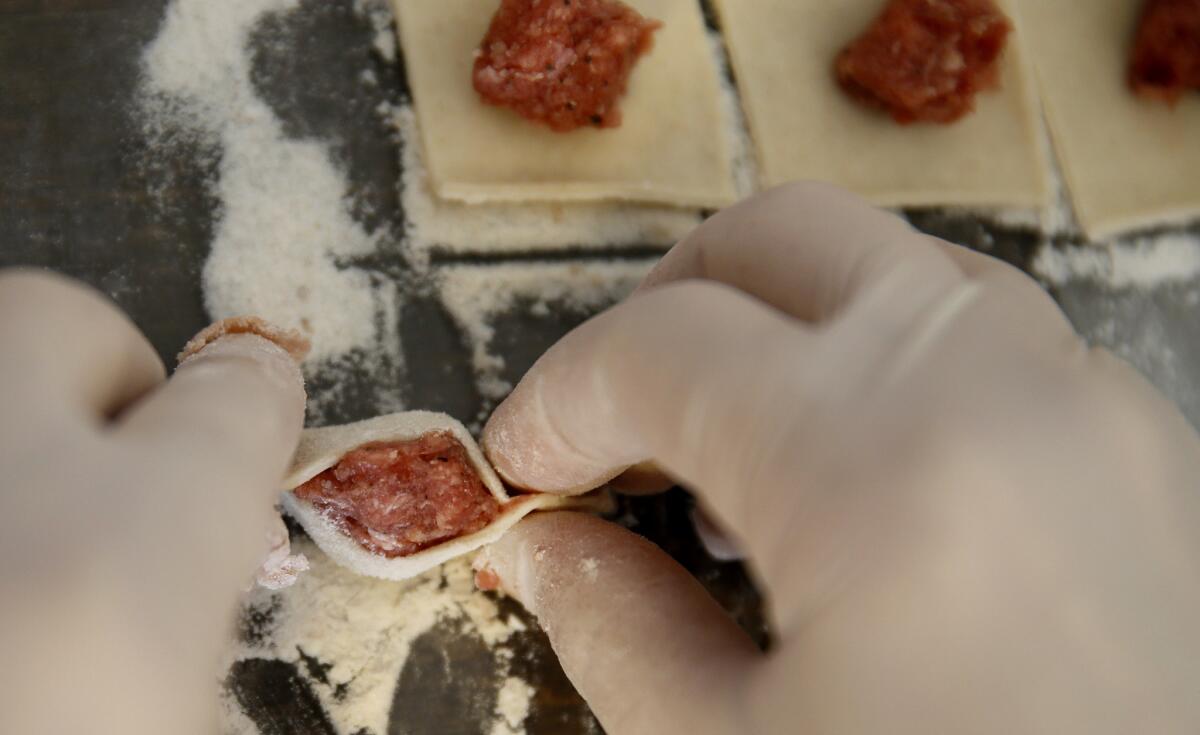
Evelina Yegiazaryan pinches the dough around the meat filling to make the manti.
Mother and son will stand like this, side by side, for six hours or so, depending on how many large orders come in. They both have their heads down, working in the early morning silence, only interrupted by the hum of the refrigerator and the occasional car speeding by. Once they finish in the early afternoon, they will have made 2,664 manti.
Sarkes, a student at Pasadena City College who says he’d like to be an actor someday, asked his father, Grant, if he could turn the family’s mostly wholesale manti business into a ready-to-serve operation a year and a half ago, and has since taken over making the dumplings with his mother. The two make trays of manti you can eat immediately, warm up at home, or freeze for later.
“This dish has been in my family for so long, so I thought: Let me get my foot in the door and see if I can take it to the next level,” says Sarkes.
After Grant and Evelina left Armenia in 1990 to settle in Pasadena, they decided to open a restaurant.
‘Secret ingredient’
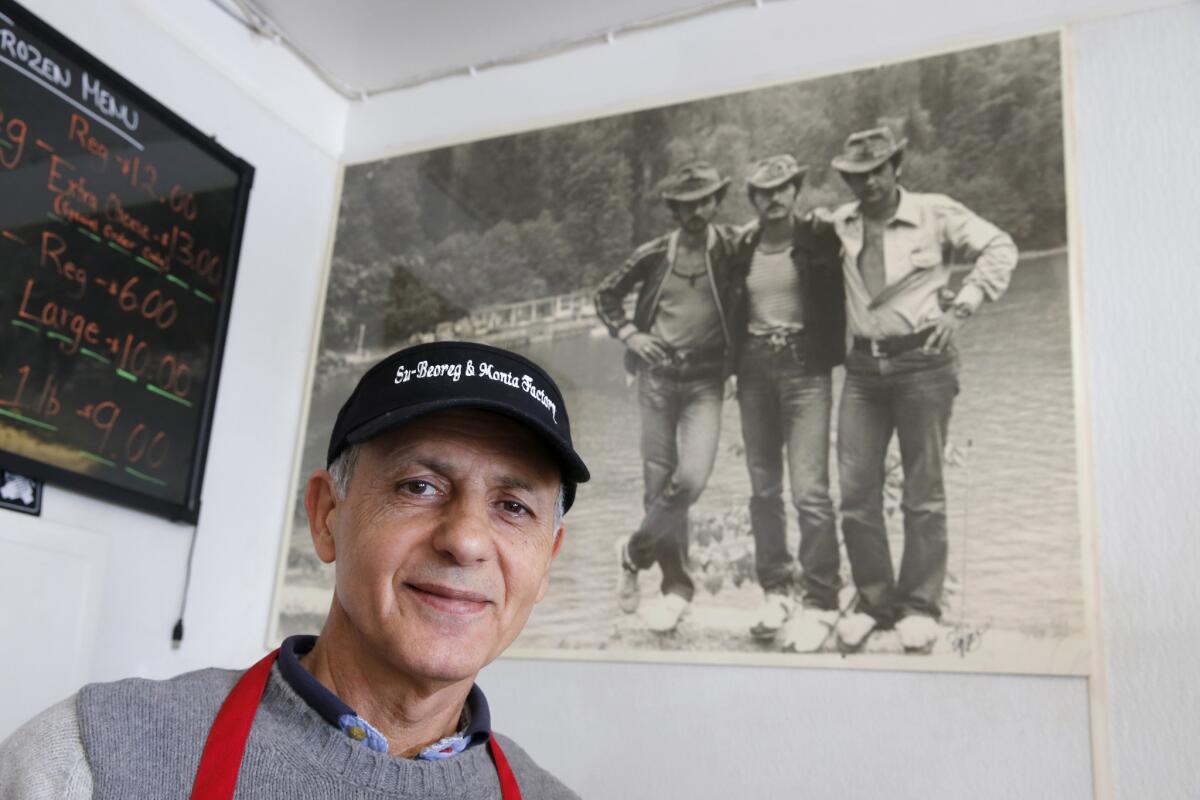
Grant Yegiazaryan is shown with a photo of himself as a young man (at right) with his two friends at the Black Sea in Soviet Russia in 1978, before he immigrated to the U.S. where he, his wife and son run the manti-making Monta Factory in Pasadena.
“When I was a kid, my mom and grandma used to make manti all day, and it would never be enough,” says Grant as he looks over his son’s shoulder. Missing his family’s manti, he and Evelina decided to start making the dumplings in Los Angeles. He found a small space in downtown L.A., named it Café Mante, and served customers beef and turkey manti, yogurt soup, lahmajoun, manakish and deli sandwiches.
The store closed eight months later. It took Grant and Evelina three years of odd jobs to get back to their dream of making manti, and this time, at their current location, they decided to just focus on the dumplings.
Sarkes removes nine 2 1/2-pound bricks of dough (made the night before) from the refrigerator, to start making the dumplings. The simple dough is made with water, flour, oil and salt. “And a secret ingredient!” interrupts Evelina.
Sarkes generously flours the counter, then uses a large rolling pin to flatten each brick into long, paper-thin sheets of dough about 4 feet wide. He transfers the sheets one by one to another counter (Sarkes and Grant built almost everything in the store themselves), then cuts the dough into 2-inch-by-2-inch squares. Behind him is a doorway into a narrow kitchen, partially blocked by a storage shelf. There’s a six-burner stove, a single oven, a mixer, a few sauté pans, squeeze bottles of oil, a scale, a Magic Bullet and a toaster oven where Sarkes heats the manti for customers.
“We really don’t need much,” says Sarkes. “Our ingredients aren’t much. I love it that way.”
Working together
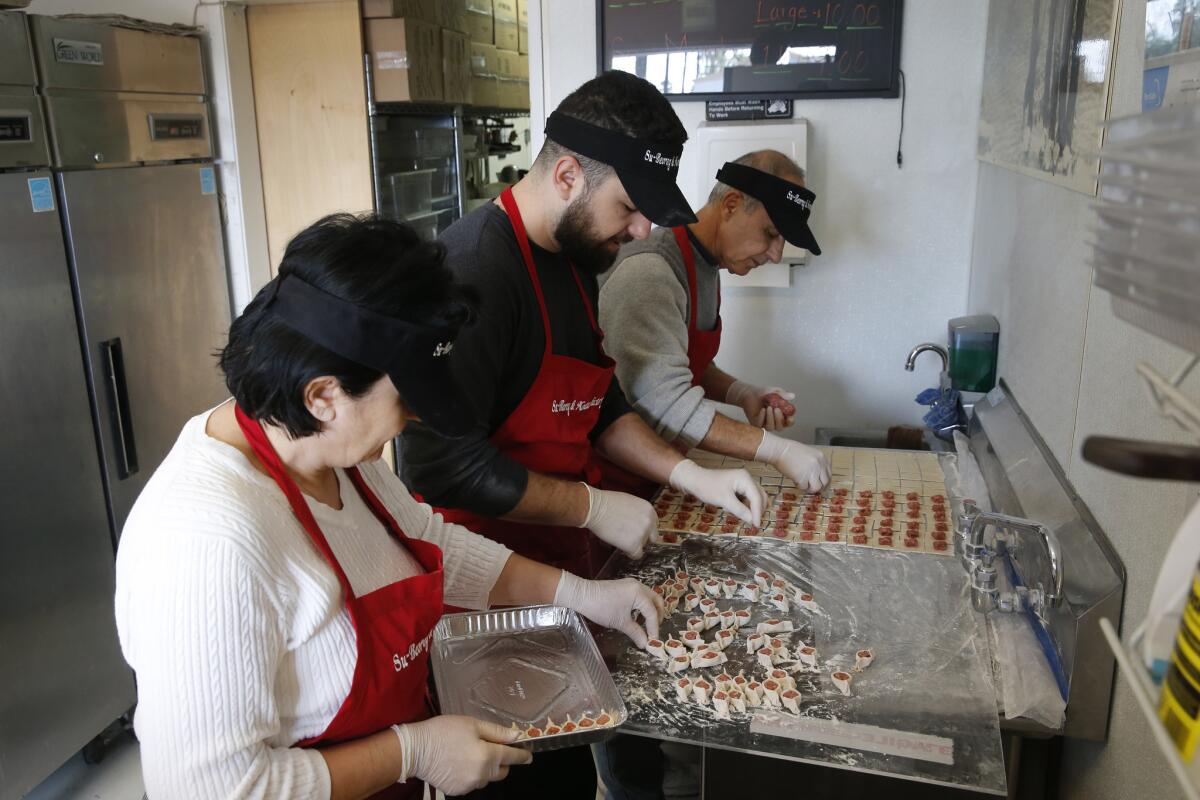
Grant Yegiazaryan, his wife Evelina and their son Sarkes make manti from scratch.
Sarkes grabs a metal bowl of the dumpling filling (ground beef, red onion, salt and pepper), pinches off small balls of the meat, then places them on the center of each square of dough. Evelina stands to his right, wearing a red visor and black-and-white striped pants, one foot resting on a nearby stool, and pats the dough with her fingers, bringing the opposite corners of the squares together around the meat, folding them until they resemble tiny boats. She then demonstrates how to make the manti for soup, by completely encasing the meat in the dough.
“In this job, it’s lots of labor,” says Evelina. “Lots of love. Other people don’t want to do it.”
Sitting above their heads is a picture of Grant, posing with two friends by the Black Sea in Soviet Russia in 1978. With the trio dressed in jeans and T-shirts and wearing hats that read “USA” across the top, the photo looks like the album cover for a rock band.
“We have customers who are in their early 90s … they’re coming from far, like Orange County or even Fresno, and they say ‘we came because our grandma used to make this,’” says Evelina as she hands another finished tray of manti to her son. “They are coming to remember the taste, and the memories.”
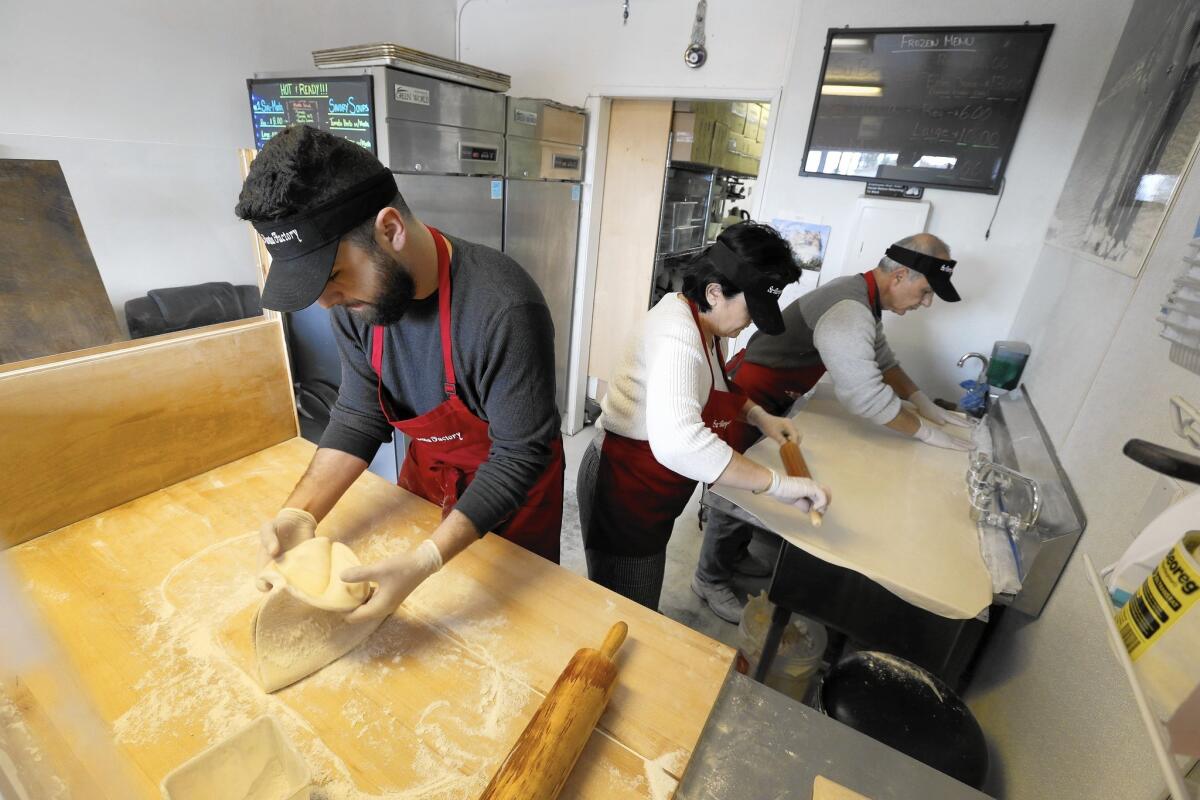
“All grandmas make it,” adds Sarkes, wrapping cellophane around their fourth finished tray of dumplings. It’s just past 7, and there are still eight more bricks of dough on the counter, waiting to be formed into someone’s long-lost childhood memory. “That’s why our slogan is ‘Better than your grandma’s, and she’ll agree.’”
Twitter: @Jenn_Harris_
More to Read
Eat your way across L.A.
Get our weekly Tasting Notes newsletter for reviews, news and more.
You may occasionally receive promotional content from the Los Angeles Times.
